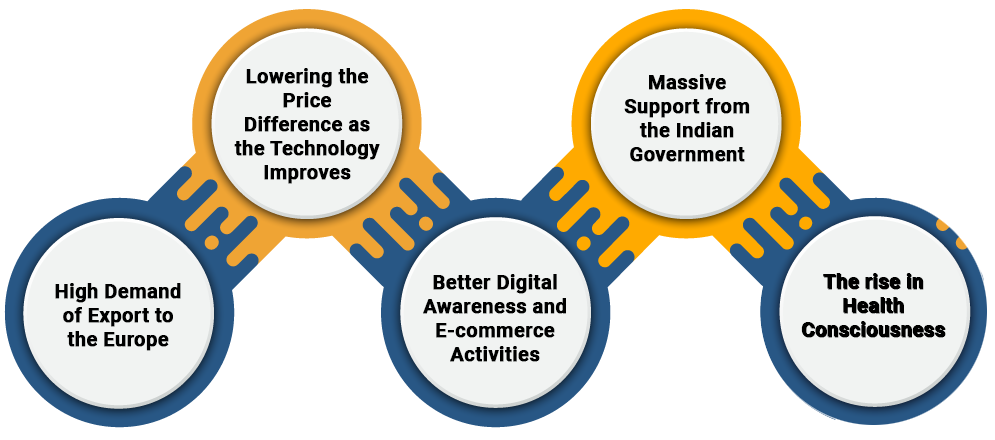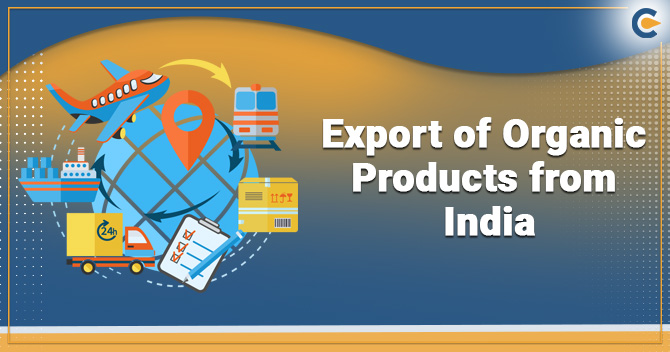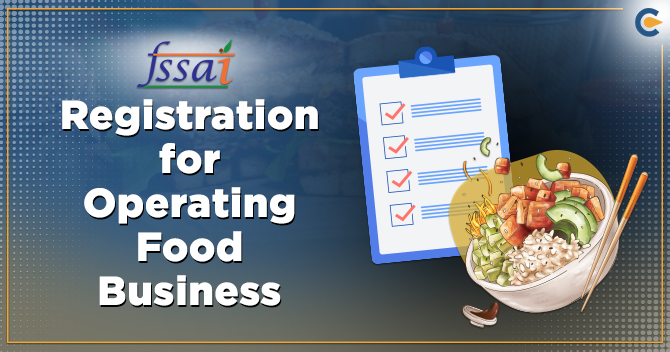The Export of organic products has been picked up by the customers in the recent years. As now the customers have become more health-conscious, that is why all such products have become even more popular.
Now, India has also become the significant exporter of organic products due to its agricultural powers. However, starting the business for organic product for exports requires brilliant planning and its execution. With the help of science and technology in agriculture we can soon witness an organic farming revolution in the country like India.
What are the Organic Products?
According to Indian law, the organic product is one whose production occurs by the prescribed standards for organic production. In essence, the production techniques are now avoiding the heavy use of human-made fertiliser and interested in using the natural products more. However the method does not stop the growth of chemical pesticides, and other additives.
However, the Genetically-Modified-Organisms or GMOs do not come under the tag of organic products as they are artificially synthesised. In the modern context, organic farming is the method that aims to cultivate land by nourishing the soil by use of natural wastes. Hence, crops receive nutrients from the animal waste, biological materials, beneficial microbes, and farm wastes.
Legal Requirements for Starting the Organic Business in India
In recent years, many more people have been trying to export organic products as demand has risen considerably. The accelerated growth of an organic industry in India is primarily because of the following reasons:


However, to start with organic food businesses in India, there are the few legal requirements which an entrepreneur needs to taken into account. And so, no companies can name a product to be ‘organic’ if they do not have the certification to prove it. The best way is to contact the legal expert and also go through Section 22 of the FSSAI as it has been mention in detail about the legal requirements for such businesses.
Mandatory Licenses and Certificates to Export the Organic Products
- Firstly, the organic food businesses in India must have an appropriate FSSAI registration.
- Businesses, whose turnover does not exceed Rs 12 lakh annually, must have an FSSAI Registration.
- Businesses whose turnover exceeds Rs 12 lakh annually, requires to obtain an FSSAI State License.
- In case business generates over Rs 20 crores annually, it must get an FSSAI Central License.
- The validity of an FSSAI registration or license is for 5 years, the renewal is mandatory.
- Other mandatory certificate businesses require India Organic Certificate Companies has to display the mark on their outer packaging according to the FSS Packaging and Labelling Regulations, 2011. Further, the companies may acquire the certification from either PGS-India or NPOP.
- Companies can also obtain the voluntary logo from the FSSAI, which certifies that the product is organic.
- Other requirements for the exporting organic fruits and vegetables are as follows:
- Phytosanitary certification: Certified by the officials of the importing country.
- Grade/quality standards: Certification regarding quality, maturity, size, and grade of the product to export to Europe, the US, or Japan.
- Pesticide and contaminants: Check for tolerance of contaminants and ensure the products fall below Maximum Residues Levels stipulated by the importing country.
- Label Certification: The labelling on the product has clearly defined information regarding the status of product.
- Import clearance: Customs handling certificate which enables businesses to export goods to other nations.
Labelling Organic Products for Export in India
Section 3 of NPOP[1] has the lists of guidelines, rules, and regulations regarding labelling of organic product. This also states that the labelling on the product has clearly defined information regarding its status. The types of labels allowed as per the classification are as follows:-
Single-Ingredient- 100% Organic
These are either raw or processed products which contained the certified organic ingredients. However, it excludes water and salt used for processing but includes all other additives. The products generally get the label for the Produce of Organic Agriculture.
Multi-ingredient- 95% Organic
These are either raw or processed products which contain at least 95% certified organic ingredients by material weight. However, it excludes water and salt but includes all other additives used for processing of the final product. Such products generally get the label of certified organic products.
Multi-ingredient- 70% Organic
These are raw or processed products that contain between 70%-95% certified organic ingredients by weight. The labelling too excludes water and salt used for processing but includes all other additives. The products generally get the label Made with Organic Ingredients. Also, the products must explicitly state the number of organic products used, and cannot simply use the label Organic.
Multi-ingredient- Less than 70% Organic
These are raw or processed products that contain below 70% certified organic ingredients. These products have to mention what ingredients in them are organic but cannot use the label ‘Organic’.
None of the products can receive a Genetic Engineering (GE) or Genetic Modification (GM) label. Furthermore, they must explicitly state all their additives and ingredients individually along with the relevant weight percentages. All such businesses must get their products inspected and also get certified by the India National Accreditation Body.
How one can Export Organic Vegetables and Cereal from India?
- Register yourself as a valid business entity.
- Make sure to obtain all required Tax registration, such as PAN and GST.
- Obtain DGFT registration that allows for import and export.
- Contact a customs agent and set up an infrastructure to ensure customs handling and clearance.
- Find the suitable buyer in a foreign zone and negotiate a contract or deal with them.
- Analyse Food Laws of the particular country and make a checklist of all the licenses which are also important side by side.
- Also approach for FSSAI registration and for NPOP for organic product certification.
- Then obtain an appropriate packaging, labelling and health certificates to make the products ready for export.
- Finally, obtain a clearance from the country you need to export. For instance, shipping to US, one needs certification from the National Organic Standards.
Conclusion
All organic products exported must have the required health certifications and quality certificates. Furthermore, companies must analyse the model indicated in the International Plant Protection Convention before exporting to any other countries. The Corpbiz also helps in obtaining the FSSAI registration which will further help in starting an organic products business activity.
Read our article: Who can have FSSAI Food License for Indian Railways and the Required Documents?











